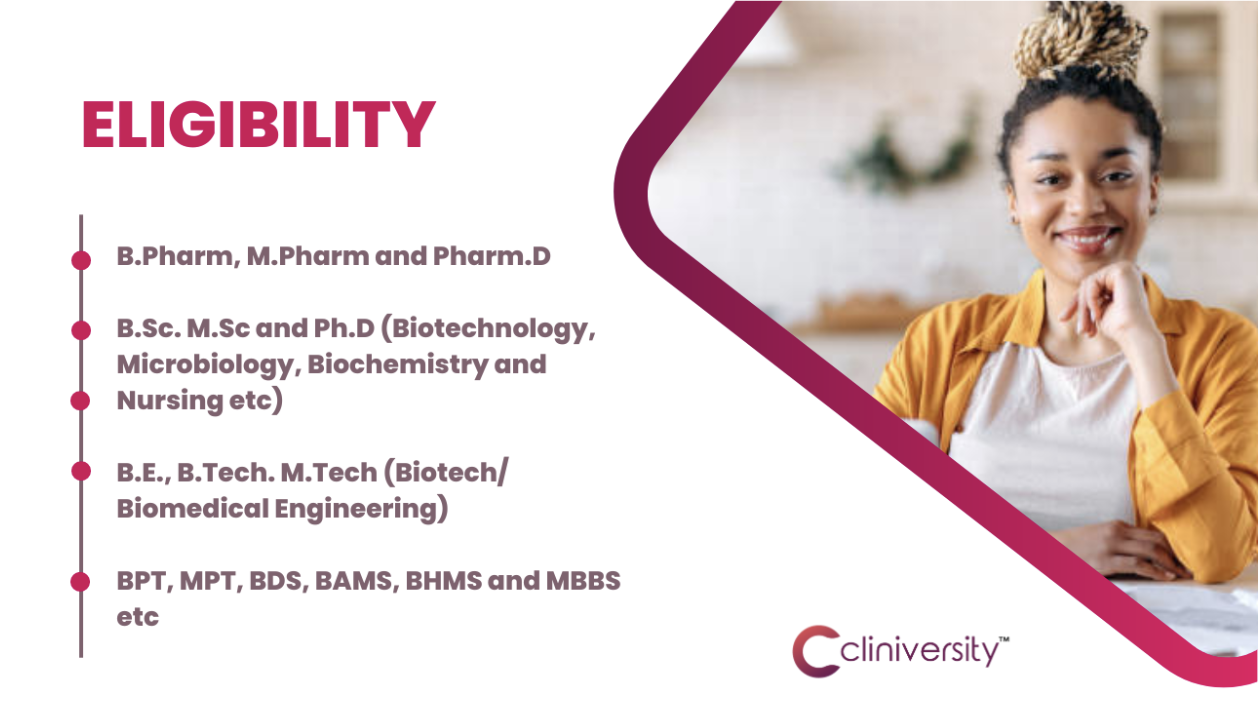LIVE ONLINE E-LARNING COURSE
Advanced Program in Clinical Research
Feels Like Real Classroom
APCRM is an Advanced credential that validates expertise in the design, conduct, and management of Clinical Trials. It covers regulatory guidelines, ethical considerations, and data management. This certification enhances career prospects in clinical research organizations, pharmaceuticals, and healthcare. It is typically achieved through accredited programs and passing a certification exam.
Schedule: 5 Days a Week (Monday to Friday)
4 Months Duration
Program Insight

Clinical Data Management
The Clinical Data Management Certification Program focuses on training professionals in the efficient collection, processing, and analysis of clinical trial data. The curriculum covers data standards, database design, data cleaning, quality control, and regulatory compliance. Participants gain proficiency in using specialized software and tools to ensure accurate and reliable data. Successful graduates are well-equipped for roles such as Clinical Data Manager, Data Analyst, or Clinical Research Coordinator. The program enhances career opportunities by providing the skills needed to manage clinical data effectively, ensuring high-quality data for regulatory submissions and supporting the advancement of medical research and development.

Pharmacovigilance
The Pharmacovigilance Certification Program provides comprehensive training in monitoring and assessing the safety of pharmaceutical products. The program covers adverse event reporting, risk management, regulatory requirements, signal detection, and post-market surveillance. Participants learn to identify, evaluate, and mitigate drug safety risks, ensuring patient safety and compliance with global regulations. Successful completion of the program prepares graduates for roles such as Pharmacovigilance Specialist, Drug Safety Associate, or Risk Management Analyst. Graduates are equipped with the knowledge and skills to manage drug safety data, contribute to regulatory submissions, and enhance the overall safety profile of pharmaceutical products in the market.

Clinical Trial Management

Clinical Data Management
The Clinical Data Management Certification Program focuses on training professionals in the efficient collection, processing, and analysis of clinical trial data. The curriculum covers data standards, database design, data cleaning, quality control, and regulatory compliance. Participants gain proficiency in using specialized software and tools to ensure accurate and reliable data. Successful graduates are well-equipped for roles such as Clinical Data Manager, Data Analyst, or Clinical Research Coordinator. The program enhances career opportunities by providing the skills needed to manage clinical data effectively, ensuring high-quality data for regulatory submissions and supporting the advancement of medical research and development.

Pharmacovigilance
The Pharmacovigilance Certification Program provides comprehensive training in monitoring and assessing the safety of pharmaceutical products. The program covers adverse event reporting, risk management, regulatory requirements, signal detection, and post-market surveillance. Participants learn to identify, evaluate, and mitigate drug safety risks, ensuring patient safety and compliance with global regulations. Successful completion of the program prepares graduates for roles such as Pharmacovigilance Specialist, Drug Safety Associate, or Risk Management Analyst. Graduates are equipped with the knowledge and skills to manage drug safety data, contribute to regulatory submissions, and enhance the overall safety profile of pharmaceutical products in the market.

Clinical Trial Management

Clinical Data Management
The Clinical Data Management Certification Program focuses on training professionals in the efficient collection, processing, and analysis of clinical trial data. The curriculum covers data standards, database design, data cleaning, quality control, and regulatory compliance. Participants gain proficiency in using specialized software and tools to ensure accurate and reliable data. Successful graduates are well-equipped for roles such as Clinical Data Manager, Data Analyst, or Clinical Research Coordinator. The program enhances career opportunities by providing the skills needed to manage clinical data effectively, ensuring high-quality data for regulatory submissions and supporting the advancement of medical research and development.

Eligibility
B.Pharm, M.Pharm and Pharm.D
B.Sc. M.Sc and Ph.D (Biotechnology, Microbiology, Biochemistry and Nursing etc)
B.E., B.Tech. M.Tech (Biotech/ Biomedical Engineering)
BPT, MPT, BDS, BAMS, BHMS and MBBS etc
Course Syllabus

Clinical trial management
Introduction to Clinical Research
Overview of Clinical Research
History and Evolution of Clinical Research
Types of Clinical Trials
Regulatory Environment and Guidelines
Medical Terminology
Good Clinical Practice (GCP)
International Council for Harmonisation (ICH) Guidelines
U.S. Food and Drug Administration (FDA) Regulations
European Medicines Agency (EMA) Regulations
Ethical Guidelines and Institutional Review Boards (IRBs)
Study Design and Methodology
Clinical Trial Design (Randomized Controlled Trials, Cohort Studies, etc.)
Protocol Development
Sample Size Determination and Statistical Considerations
Randomization and Blinding Techniques
Clinical Trial Management
Roles and Responsibilities in Clinical Trials (Investigators, Sponsors, CROs)
Site Selection and Initiation
Recruitment and Retention of Study Participants
Informed Consent Process
Study Monitoring and Closeout
Safety Reporting and Pharmacovigilance
Adverse Event Reporting
Serious Adverse Events (SAEs) and Suspected Unexpected Serious Adverse Reactions (SUSARs)
Safety Monitoring Committees
Risk Management and Mitigation Strategies
Quality Assurance and Compliance
Audits and Inspections
Quality Assurance Processes
Compliance with GCP and Regulatory Requirements
Handling Non-Compliance and Deviations
Ethical Considerations in Clinical Research
Principles of Bioethics (Autonomy, Beneficence, Non-maleficence, Justice)
Ethical Issues in Clinical Trials (Vulnerable Populations, Consent)
Human Subjects Protection
Confidentiality and Data Privacy
Emerging Trends and Technologies
Digital Health and Mobile Technologies in Clinical Research
Real-World Evidence and Big Data Analytics
Personalized Medicine and Genomics
Innovative Trial Designs (e.g., Adaptive Trials)
Practical Components
Case Studies and Real-World Scenarios
Workshops and Hands-On Training
Mock Clinical Trial Exercises
Software Training (e.g., EDC systems, statistical software)
CONTACT US
TO KNOW MORE CALL
Call : +91 7066457703
Or email at info@cliniversity.com
Program Features
Industry expert mentors – Learn from industry experts in our comprehensive program, where seasoned professionals share their knowledge and insights. Gain hands-on experience, practical skills, and up-to-date information on the latest industry trends. Enhance your expertise and advance your career with guidance from leaders in the field.
Outcome Based Training (OBT) : Cliniversity is the only institute who offers outcome based training and placement programs. Experience Outcome Based Training, where the focus is on achieving specific, measurable results. Our program is designed to equip you with practical skills and knowledge that directly impact your professional success. Through targeted learning objectives and real-world applications, you’ll achieve tangible outcomes that enhance your career and personal growth.
24*7 learning through LMS access: A Learning Management System (LMS) streamlines education by providing a centralized platform for course administration, delivery, and tracking. It offers interactive tools, multimedia content, and assessments, enhancing the learning experience. Ideal for both educators and students, an LMS facilitates efficient, flexible, and personalized learning anytime, anywhere.
Regular exercise & assignments : Regular exercise and assignments are integral to our program, reinforcing learning and promoting practical application. Consistent practice through exercises sharpens skills, while assignments ensure comprehension and retention of material. This structured approach boosts confidence, prepares you for real-world challenges, and enhances overall academic performance.
Upgraded training Program : Embark on an upgraded training program designed to elevate your skills and expertise. Featuring the latest industry insights, cutting-edge tools, and advanced methodologies, this program offers an unparalleled learning experience. Stay ahead of the curve and unlock new opportunities for professional growth and success with our upgraded training program.
End to End Placement preparation: Experience comprehensive end-to-end placement preparation, tailored to ensure your readiness for career success. Our program covers every aspect, from resume building and interview techniques to soft skills development. With personalized guidance and extensive resources, we empower you to confidently navigate the job market and secure your ideal placement. Task based mock interviews prepare you perfectly on all aspects.
Easy & Affordable: Easy learning and affordable fees with installments option make this program the 1st choice for the aspirants.
Certification – Clinical Research Certification
Our Medical Coding program offers a valuable certification upon completion, recognizing participants for their dedication to mastering essential coding skills. While not an APPC certificate, our program’s participation certificate signifies your commitment to advancing in the field. Gain practical knowledge, boost your resume, and open doors to exciting opportunities in healthcare coding.

OUR PLACEMENTS
Career Triumphs: APCRM Graduates Shine Bright in Corporate Placements
Job Profiles- (Designations and Roles)

CLINICAL TRIAL MANAGEMENT JOB PROFILES
Clinical Research Coordinator (CRC):
1. Protocol Implementation: Ensure adherence to study protocols and regulatory requirements at the study site.
2. Participant Recruitment: Screen and enroll eligible participants according to study criteria.
3. Informed Consent: Facilitate the informed consent process, ensuring participants understand the study risks and benefits.
4. Data Collection: Collect and record accurate and complete study data, including medical histories and study-specific assessments.
5. Study Documentation: Maintain regulatory documentation, including case report forms (CRFs) and investigator site files (ISFs).
6. Study Coordination: Coordinate study visits, procedures, and follow-up activities for participants.
7. Safety Reporting: Monitor and report adverse events (AEs) and serious adverse events (SAEs) to the appropriate regulatory authorities and study sponsors.
8. Quality Assurance: Ensure compliance with Good Clinical Practice (GCP) guidelines and internal standard operating procedures (SOPs).
9. Communication: Serve as the primary point of contact between the study site, investigators, sponsors, and regulatory authorities.
10. Training and Education: Provide training to study staff and investigators on study protocols, procedures, and regulatory requirements.
Clinical Research Associate (CRA):
1. Site Monitoring: Conduct routine site visits to ensure protocol compliance, data integrity, and participant safety.
2. Site Initiation: Perform site initiation visits (SIVs) to train study staff and ensure readiness for study initiation.
3. Site Closeout: Conduct site closeout visits to ensure all study activities are completed, data is accurate, and regulatory documents are archived appropriately.
4. Data Verification: Review and verify study data against source documents, ensuring accuracy and completeness.
5. Query Resolution: Generate and track data queries to resolve discrepancies or missing information in study data.
6. Regulatory Compliance: Ensure compliance with GCP, regulatory requirements, and study protocols.
7. Study Documentation: Maintain and update trial master files (TMFs) and other study documentation as per regulatory standards.
8. Risk Management: Identify and mitigate risks to study quality, participant safety, and data integrity.
9. Communication: Communicate effectively with study sites, sponsors, and other stakeholders to address study-related issues and ensure timely resolution.
10. Reporting: Prepare monitoring reports, study progress updates, and other documentation for internal and external stakeholders.
Principal Investigator (PI): If you are from a medical background then you can work as a Principal Investigator (PI). PI holds the primary responsibility for the conduct of a clinical trial at the investigative site. Their role is pivotal in ensuring the safety of participants, the integrity of data, and compliance with regulatory requirements.
MEET OUR Alumni
What’s Students Say about Cliniversity
Hands-On Training in Pharmacovigilance
Database
Case Studies and Practical Approach
Practical training in medical coding is Important as it bridges the gap between theory and real-world application. Case study bases learning equips aspiring coders with hands-on experience crucial for accuracy and efficiency. It enhances proficiency in code assignment, ensures compliance with evolving guidelines, and fosters a deep understanding of the intricacies within the healthcare landscape. Practical training cultivates problem-solving skills, critical thinking, and adaptability, preparing coders for the dynamic challenges they’ll face in the industry. This experiential learning not only solidifies theoretical knowledge but also instills confidence, making individuals better-prepared and more effective contributors to the essential field of medical coding.

Here Is The Most Frequently Asked Questions
Whats a Hands On database training means
Hands on database training means where participants engage directly with database systems. Each candidate receives separate login credentials to practice in the database. Through practical exercises, real-world scenarios, and guided instruction, learn database design, querying, and management techniques.
What will be the right profile for me to start a career?
It totally depends on your area of interest. However, all these domains and the good career opportunities and career prospects. We believe that you will automatically understand your area of interest when you start learning.
Are you providing 100% placements?
Yes, the program is designed to equip you with the right knowledge and skills to make your professional ready and get you 100 % placements. But, we never guarantee 100% placement as it totally depends on requirements from the industry, how you developed during the certification program and how you perform at the time of interview.
Can I pay the fees in installments?
Yes. To know the installment options call on +91-7066457703
How long will you provide placement assistance?
You will get lifetime placement assistance.
What if I miss any session?
Don’t worry, We are giving you Learning Management System (LMS) access which will be with your 24*7. It streamlines education by providing a centralized platform for course administration, delivery, and tracking. It offers interactive tools, multimedia content, and assessments, enhancing the learning experience. Ideal for both educators and students, an LMS facilitates efficient, flexible, and personalized learning anytime, anywhere.
Is there any waive off in fees?
You can check if there is any waive off in fees. Call +91-7066457703
In which companies do you provide the placements?
There are multiple industries where you can get placement assistance.
- IT healthcare – Accenture, TCS, Cognizant, TCMS, Wipro
- Contract Research Organizations (CRO) – Fortrea, IQVIA, Parexel, Syneos, PPD, Covance, ICON, JSS, JVK, Lambda, SIRO clinpharm,
- Medical Coding Companies : Optum, Episource, Agilon Health, GEBBS, IKS, Advantmed, Augmedix, CorroHealth
- Pharmaceutical companies – GSK, Astrazenica, Novo Novartis, Pfizer, Abbott and more
- Multispeciality Hospitals
- Medical Writing & Scientific writing companies : Cactus communication, Springer, Elsevier, Crest Premedia




































